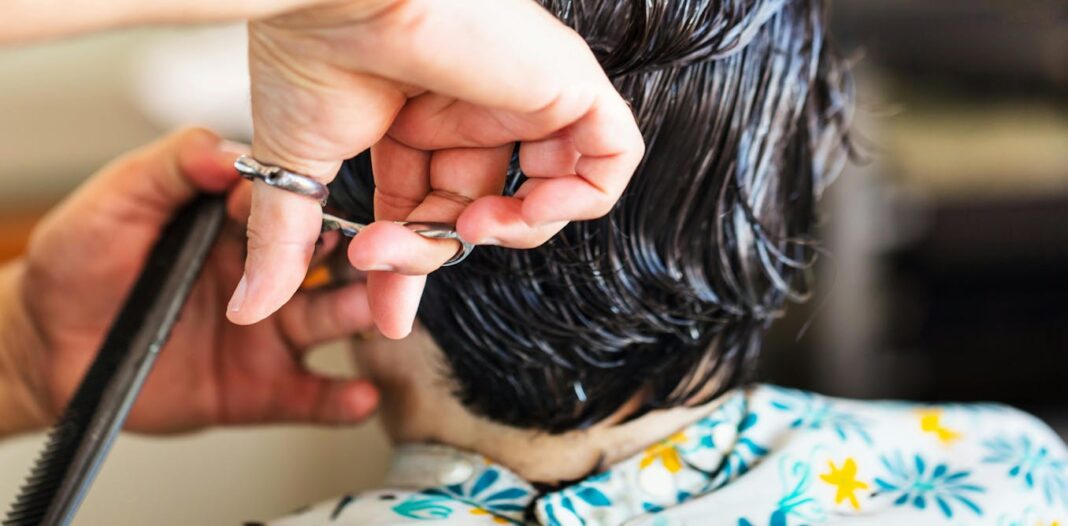Remind me, what are they made out of?
Hair and nails are made mostly from keratin. Both grow from matrix cells below the skin and grow through different patterns of cell division.
Nails grow steadily from the matrix cells, which sit under the skin at the base of the nail. These cells divide, pushing the older cells forward. As they grow, the new cells slide along the nail bed – the flat area under the fingernail which looks pink because of its rich blood supply.
A hair also starts growing from the matrix cells, eventually forming the visible part of the hair – the shaft. The hair shaft grows from a root that sits under the skin and is wrapped in a sac known as the hair follicle.
This sac has a nerve supply (which is why it hurts to pull out a hair), oil-producing glands that lubricate the hair and a tiny muscle that makes your hair stand up when it’s cold.
At the follicle’s base is the hair bulb, which contains the all-important hair papilla that supplies blood to the follicle.
Matrix cells near the papilla divide to produce new hair cells, which then harden and form the hair shaft. As the new hair cells are made, the hair is pushed up above the skin and the hair grows.
Unlike nails, our hair grows in cycles
Scientists have identified four phases of hair growththe:
-
anagen or growth phase, which lasts between two and eight years
-
catagen or transition phase, when growth slows down, lasting around two weeks
-
telogen or resting phase, when there is no growth at all. This usually lasts two to three months
-
exogen or shedding phase, when the hair falls out and is replaced by the new hair growing from the same follicle. This starts the process all over again.
Each follicle goes through this cycle 10–30 times in its lifespan.
If all of our hair follicles grew at the same rate and entered the same phases simultaneously, there would be times when we would all be bald. That doesn’t usually happen: at any given time, only one in ten hairs is in the resting phase.
While we lose about 100–150 hairs dailythe average person has 100,000 hairs on their head, so we barely notice this natural shedding.
So what affects the speed of growth?
Genetics is the most significant factor. While hair growth rates vary between individuals, they tend to be consistent among family members.
Nails are also influenced by genetics, as siblings, especially identical twins, tend to have similar nail growth rates.
But there are also other influences.
Age makes a difference to hair and nail growth, even in healthy people. Younger people generally have faster growth rates because of the slowing metabolism and cell division that comes with ageing.
Hormonal changes can have an impact. Pregnancy often accelerates hair and nail growth rates, while menopause and high levels of the stress hormone cortisol can slow growth rates.
Nutrition also changes hair and nail strength and growth rate. While hair and nails are made mostly of keratin, they also contain water, fats and various minerals. As hair and nails keep growing, these minerals need to be replaced.
That’s why a balanced diet that includes sufficient nutrients to support your hair and nails is essential for maintaining their health.
No, hair and nails don’t grow after death
A persistent myth that may relate to the legends of vampires is that hair and nails continue to grow after we die.
In reality, they only appear to do so. As the body dehydrates after death, the skin shrinks, making hair and nails seem longer.
Morticians are well aware of this phenomenon and some inject tissue filler into the deceased’s fingertips to minimise this effect.
Conclusion
Hair and nails are fascinating and complex structures that are influenced by a range of factors, including genetics, age, hormonal changes and nutrition. While they may seem like simple appendages, they play an important role in our overall health and wellbeing. By understanding how they grow and what affects their growth, we can take steps to maintain their health and appearance.
FAQs
Q: How fast do hair and nails grow?
A: Hair grows at an average rate of 1 centimeter per month, while nails grow at an average rate of over 3 millimetres per month.
Q: Why do some people’s hair and nails grow faster than others?
A: Genetics play a significant role in determining hair and nail growth rates, but other factors such as age, hormonal changes and nutrition can also influence growth rates.
Q: Can hair and nails grow after death?
A: No, hair and nails do not grow after death. The appearance of growth is due to the dehydration of the body after death, which causes the skin to shrink and make hair and nails appear longer.




